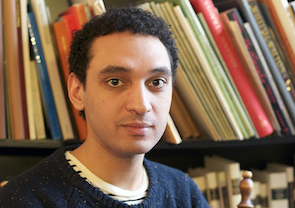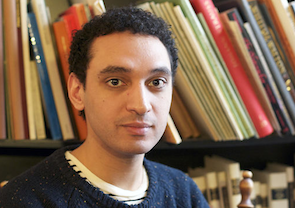
“Music doesn't care about borders,” insists composer Mohammed Fairouz.
“When you stand in Jerusalem’s church of the Holy Sepulchre you might hear Franciscan monks singing choral music, an Imam reciting the call to prayer outside in the street, a shofar (the ram's horn instrument used in Jewish religious services) sounding next to the Wailing Wall. All these sounds have no respect for boundaries.”
Fairouz’ music is all around the Bay Area this month. On Tuesday Feb. 25, pianist Lara Downes and the Del Sol Quartet gave the West Coast premiere of two major recent works, his string quartet Named Angels and his Piano Sonata No. 2, The Last Resistance, at the Center for New Music. This weekend, young pianists will premiere a new set of his piano miniatures, Rogues Gallery, at the Mondavi Center. And on March 21-22, Israeli-American cellist Maya Beiser will premiere a new Fairouz composition at the Yerba Buena Center.
Fairouz grew up in a world of permeable borders. Born in New York in 1985 to Arab parents, he spent considerable portions of his childhood in London and other cosmopolitan cities, soaking up musical influences far broader than just Western classical music.
“I heard Arab music around me all the time,” he recalled. “My parents would play it while I was growing up, and I’d also hear it in visits — it's everywhere, not just on YouTube, but also because if you step into a cab in New York or just walk down the streets, you hear the Panjabi beats. Music is happening everywhere constantly. The question is not whether we're hearing it, but whether we choose to listen to it.”
He was especially moved by the great midcentury Egyptian diva Umm Kulthum, a favorite of Maria Callas, who died in 1975 after becoming the most popular singer in the Arab world. Those global influences continued to suffuse his music even after his traditional classical training at the Curtis Institute and New England Conservatory. His teachers included composers Gyorgy Ligeti and Gunther Schuller.
“We’re in an important place for artists and music. We are at a juncture for our species that’s the most important we've ever been in. — Mohammed Fairouz
Still safely under 30, Fairouz has already written an opera, four symphonies, an oratorio, 19 song-cycles (and scores of songs), choral, electronic, and dozens of chamber works. His music has appeared on Naxos, Innova, Cedille, Dorian, and other labels and has been performed by increasingly prominent musicians such as Imani Winds, violinist Rachel Barton Pine, The Knights, and many others.
And although he’s found most of his success in fairly traditional fashion, with orchestras and other standard classical performers commissioning his music rather than, say, starting a band and playing it himself, Fairouz is recognizably a 21st-century composer who tweets, updates his Facebook page, blogs for The Huffington Post, happily (and volubly) talks to the media, and embraces as many of the sounds — pop, traditional, classical — of our 21st-century global culture as he can get his ears around.
He’s also engaged not just with global music, but also with global concerns — humanitarian, political, cultural — and given his background and the prominence of the relationship between the West and the Middle East in headlines as he grew up, it’s no surprise that some of his most striking music involves headline events like the September 2001 attacks on the World Trade Center (Symphony No. 4, In the Shadow of No Towers), the Arab Spring (Tahrir, his clarinet concerto featuring David Krakauer), and many others, including both works on Tuesday’s program.
“We’re in an important place for artists and music,” he says. “We are at a juncture for our species that’s the most important we've ever been in. In the last 100 years, we've been pushed into closer proximity to each other more quickly and viscerally than in the last million. But our cultural sensitivity hasn't kept up.
“That's the job of artists, to focus on the restoration of human spirit,” Fairouz continues. “It’s much more difficult to dehumanize people if you know their music, their poetry, their art. It’s a prerequisite to first dehumanize people to be able kill them, but if you really know their culture, you can't do that. So that’s the role of artists, reminding us of our humanity, asserting the importance of the common heritage of mankind. It's not the mission of every composer, but for me, it's part of my personality.”
At this weekend’s 2014 Mondavi Center Young Artists Competition, pianist Lara Downes (who played his epic Second Sonata Tuesday and recorded an earlier miniature on her last album) is including the world premiere of Fairouz’ four newest Piano Miniatures in his ongoing series. A dozen young pianists will try their hands at this set collectively called Rogues Gallery, inspired by villains from Batman comics. The set is the third in a series commissioned by the Mondavi Center, at Downes’ instigation, when she realized that piano teachers don’t make contemporary music a priority for their students, in part because of a paucity of appropriate recent works.
That’s just one of many upcoming projects for the amazingly prolific Fairouz, including a memorial to his teacher, Gyorgy Ligeti, premiering at Carnegie Hall in April, another big piano sonata (Proust Among the Nations), a new oratorio for the Indianapolis Symphony, a new cello concerto for the great Israeli-American cellist Maya Beiser and the Detroit Symphony, and much more.
The Bay Area gets the latest next month when Beiser performs Fairouz’ new Kol Nidre for cello and prerecorded sounds along with other new works by contemporary composers at the Yerba Buena Center March 21-22. She’ll sing the full Aramaic text (annually recited on the eve of the Jewish day of atonement) and play along with “this heart-wrenching recording of Cantor Yoselle Rosenblatt singing the Kol Nidre in 1930s Vienna, slightly before the Holocaust,” Fairouz says.
A Arab-American composer writing for an Israeli-born cellist in a setting of one of Judaism’s most venerated texts; that’s the borderless, cooperative world Mohammed Fairouz wants to live in, the world he hopes his music will help make real.
Maya Beiser: All Vows, Mar 21-22, 2014, 8:00 p.m., YBCA Forum, $30 (advance purchase)-$35 (door); student, senior, teacher, $25-$30; More information on All Vows by Maya Beiser.

